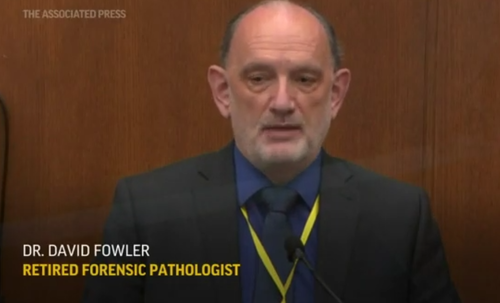Pathologist Blames Floyd Death On Heart Problem, Would Not Have Classified As Homicide
A forensic pathologist testified on Wednesday that George Floyd died of a sudden heart rhythm disturbance due to his advanced heart disease, and not from lack of oxygen from the way he was restrained by former Minneapolis police officer Derek Chauvin, according to the Associated Press. Chauvin, 45, is charged with murder and manslaughter in Floyd’s death.
Former Maryland chief medical examiner Dr. David Fowler said that the combination of fentanyl and methamphetamine in Floyd’s system, heart disease, and potential carbon monoxide poisoning from automotive exhaust were contributing factors in the 46-year-old Floyd’s death last May.
“All of those combined to cause Mr. Floyd’s death,” said Fowler, who also said that he would have classified the manner of death as “undetermined,” not homicide as the county’s chief medical officer ruled. He added that some of the contributing factors could be ruled homicide and others could be ruled accidental.
Chauvin attorney Eric Nelson is trying to prove that the 19-year Minneapolis police veteran did what he was trained to do and that Floyd died because of his illegal drug use and underlying health problems.
Prosecutors say Floyd died because the white officer’s knee was pressed against Floyd’s neck or neck area for 9 1/2 minutes as he lay pinned to the pavement on his stomach, his hands cuffed behind him and his face jammed against the ground. -AP
Potential factors listed by Fowler included: “Floyd’s narrowed arteries, his enlarged heart, his high blood pressure, his drug use, the stress of his restraint, the vehicle exhaust, and a tumor or growth in his lower abdomen that can sometimes play a role in high blood pressure by releasing “fight-or-flight” hormones” per the report, all of which could have acted together to make Floyd’s heart work harder and/or go into arrhythmia before it suddenly stopped.
On cross-examination, prosecutor Jerry Blackwell attacked Fowler’s findings, getting the former chief medical examiner to admit that he didn’t take into account the weight of Chauvin’s gear when he analyzed the pressure on Floyd’s body, or that anyone who dies after being deprived of oxygen technically dies of arrhythmia.
“And if a person dies as a result of low oxygen, that person is also going to die ultimately of a fatal arrhythmia, right?” asked Blackwell, to which Fowler responded: “Correct. Every one of us in this room will have a fatal arrhythmia at some point.“
Blackwell also attacked the carbon monoxide claim.
“You haven’t seen any data or test results that showed Mr. Floyd had a single injury from carbon monoxide. Is that true?” Blackwell asked. “That is correct, because it was never sent,” Fowler replied.
Blackwell then countered by noting that Chauvin’s squad car was a gas-electric hybrid, and Fowler had no data on how much carbon monoxide was actually released – or if the engine was running at the time.
While several medical experts called by the prosecution have concluded that Floyd died from lack of oxygen due to the way Chauvin restrained him, Fowler said that the knee on Floyd was “nowhere close to his airway,” and that Floyd’s ability to speak and groan showed that the airway was still open. He also said that there wasn’t enough pressure to cause bruises or scrapes on Floyd’s neck or back – and that Floyd did not complain of vision changes or other symptoms which would indicate insufficient oxygen to the brain.
“The bottom line is, moving air in and out, and speaking and making noise is very good evidence that the airway was not closed,” said Fowler.
Tyler Durden
Wed, 04/14/2021 – 20:00
via ZeroHedge News https://ift.tt/2RrZEXg Tyler Durden
